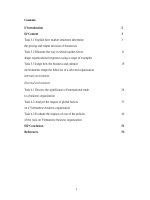Aspects of Contract Negligence for Business Assignment 1 BTEC Nguyen Huu Phong 2017
Bạn đang xem bản rút gọn của tài liệu. Xem và tải ngay bản đầy đủ của tài liệu tại đây (269.67 KB, 12 trang )
ASSIGNMENT 1 FRONT SHEET
Qualification
BTEC Level 5 HND Diploma in Business
Unit number and title
Unit 5: Aspects of Contract and Negligence for Business
Assignment due
Assignment submitted
Learner’s name
Assessor name
CLASS:
Learner declaration:
I certify that the work submitted for this assignment is my own and research sources are fully acknowledged.
Learner signature
Date
Grading grid
P1.1
P1.2
Assignment title
P1.3
P2.1
P2.2
P2.3
M1
M2
M3
Aspects of Contractual liability in Business context
D1
D2
D3
In this assignment, you will have opportunities to provide evidence against the following criteria.
Indicate the page numbers where the evidence can be found.
Assessment criteria
Expected evidence
Task
no.
Assessor’s Feedback
LO1. Understand the essential elements of a valid contract in a business context
1.1 Explain the importance
of the essential elements
required for the formation of
a valid contract.
Point out and give brief
explanation of essential elements
of a valid contract namely:
Offer and acceptance;
Intention to create legal
relations;
Consideration;
Capacity;
Privity of contract
Achieved
1.1
Not achieved
Provide brief understanding
1.2 Discuss the impact of
different types of contract
1.3 Analyze terms in
contracts with reference to
their meaning and effect
about basic types of contract,
namely: Face to face; Written and
Distance
selling
(electronic
contracts).
Point out characteristics of
each type to show the differences
among these types of contract
Discuss the effects of each
types of contract on the company
and its benefits
- Analyze the following terms that
occur in your selected contracts,
if each of them is presented:
Condition;
Warranty;
Other innominate terms;
Express;
Implied;
Exclusion clauses
Achieved
2.1
Not achieved
Achieved
3.1
Not achieved
LO2. Be able to apply the elements of a contract in business situations
2.1 Apply the elements of
contract in given business
scenarios.
Identify whether those essential
elements have been integrated in
your selected contracts by
pointing out exactly those
elements.
Achieved
1.2
Not achieved
2.2 Apply the law on terms
in different contracts.
Identify and explain what terms
2.3 Evaluate the effect of
different terms in given
contracts.
Figure out whether those
have been used in the contracts
contracts selected contain those
terms by quoting them precisely.
Assessment criteria
Merit descriptor No.1 (M1)
Merit descriptor No.2 (M2)
Achieved
2.2
Not achieved
Achieved
3.2
Not achieved
Expected Evidence
Identify and apply strategies Achieved
to find appropriate
solutions.
Select and design
appropriate techniques
Feedback
(note on Merit/Distinction if applicable)
Not achieved
Achieved
Not achieved
Merit descriptor No.3 (M3)
Present and communicate
appropriate findings
Achieved
Not achieved
Distinction descriptor No.1 (D1)
Distinction descriptor No.2 (D2)
Distinction descriptor No.3 (D3)
Use critical reflection to
evaluate own work and
justify valid conclusions.
Achieved
Take responsibility for
managing and organizing
activities
Achieved
Demonstrate
convergent/lateral/creative
thinking
Achieved
Not achieved
Not achieved
Not achieved
Summative feedback
Assessor’s Signature
IV Grading Check:
Date
Comments if any:
Agree
Disagree
IV Signature
Modify grade to
Date
<ATTACHED EVIDENCE>
Introduction
LO1. Understand the essential elements of a valid contract in a business context
1.1 Explain the importance of the essential elements required for the formation of a valid contract.
1.2 Discuss the impact of different types of contract
1.3 Analyze terms in contracts with reference to their meaning and effect
LO2. Be able to apply the elements of a contract in business situations
2.1 Apply the elements of contract in given business scenarios.
2.2 Apply the law on terms in different contracts.
2.3 Evaluate the effect of different terms in given contracts.
Conclusion
References
Contract 1
Contract 2
Introduction
In business, the contract is an important factor and decided in the success of a project, a merger, sale or
anything that affects the interests of the parties involved in the contract. Drafting of a detailed contract and
contribution in the success of the agreement. Understand the elements and terms of the contract will help
the parties to create less risk contract, completing the terms and brings many benefits. In this report, I will
analyze the elements of a contract and from there go to two contracts to analyze better these factors, how
the contract terms are reasonable and avoid risks.
LO1. Understand the essential elements of a valid contract in a
business context
1.1
Explain the importance of the essential elements required for the
formation of a valid contract.
The contract is an agreement between two or more parties to do or not to do a certain task in the
framework of the law. Contracts often associated with the project, in which a party want to have
agreement with other parties to implement the project or part of their project. And such as projects, there
are social and political project and production project, the contract may be the civil agreement for
economy or society.
Void contracts are contracts that do not adhere to the conditions in effect by law and it have no
legal value, it does not give rise to rights and obligations of the parties.
The voidable contract is in effect but still have the risk of lapse. This contract can have a party
chooses to terminate the contract and it to be disabled. However, if neither party would do it, then the
contract is still in force.
A contract need to have the necessary elements and these elements are stated clearly in the contract
a. Agreement
Agreement is a concept that it expanded to include any arrangement or understanding
between two parties or more about their rights and responsibilities towards each other.
Agreement usually include offer and acceptance.
Offer is meant to be a thought and can be recovered or retrieved by offeror giving the offer
at any time before the offer is in effect or offeree agrees. Offer includes the offeror and the
offeree in an agreement to do or not do something.
The valid requirements of the offer includes the announcement of clear agreements for the
parties concerned to determine with seriously intentions and determine the conditions of
goods, price, quality, ... must be clearly defined and legal requirements.
One of the parties can terminate the offer in the case such as the offeree answers rejected;
time limit to answer accepted; When notification of change or withdraw the proposal in effect;
the party receiving the offer agreement to adjust the suggestions from the offeror.
Acceptance is an act that expresses or implied by the behavior expressed the consent with
the terms of an offer or an invitation, the invitation request.
—
Requirement
b.
Consideration
According to legal dictionary page stated that: "Consideration is an essential element for
the formation of a contract. It may consist of a promise to perform a desired act or a promise
to refrain from doing an act that one is legally entitled to do". More specifically, consideration
was understood as something of value that a party spent to gain a benefit from another party.
Beside that, there are some case of exception in consideration such as past consideration and
existing duty. Past consideration is reciprocal be done before the other party to give
suggestions and existing duty is available as the police catch the criminals will not be
rewarded.
c. Intent to create legal relation
Intention to create legal relations is from the side of a clear intention want to contracts and
want to be bound by the agreement is given.
Intention to create legal relations including 2 types are Domestic/Social Agreements
(usually not be binding) and Commercial Agreements (usually binding). Domestic Agreements
are the agreement between family members and Commercial Agreements are the agreement
between the friends. Intention to create legal relations through the signature of each side that
expressed the wish fulfillment, contract concluding effect.
d. Capacity
Capacity is understood as the capacity to bear the responsibilities of those involved in the
contract. The law stipulates that individuals involved in a contract must be able to sign the
contract, otherwise it is disabled. Qualified adults can participate in contracts and enforcing the
law.
For individual, person under 7 years old have no behaviour capacity, so contract will not
have effect and person under 18 years old must have the guardian.
For company and organization, legal representative for represent of company and the
company must form the contract type matching businesses registered with the law.
e. Privity
Privity is understood that only the parties in the contract to be bound by the rights and
obligations created by contract. The other stakeholders are not in the contract that they are not
bound by the rights and terms specified in the contract.
1.2
Discuss the impact of different types of contract
Currently there are 3 main types of contracts are commonly used in business include oral
contract, writing contract, distance selling. Depending on the circumstances, the situation and the
type of business that the parties will use different types of contracts to increase the efficiency,
comfort and fit.
First, about oral contract, oral contract is a form of contract that the parties deal with each
other by talking and communicating. Oral contract can have text or other physical evidence comes
to enhance the credibility of the parties concerned. However, basically, the oral contract not
through text.
Advantages
Disadvantages
Type of
business
Easy, fast, convenient for each side. Flexibly change according to each
situation, easy to edit.
There is no evidence of what was agreed in the oral contract, difficulty of
proof. Easy conflict occurs when two parties arising contradictions in the
agreement. The reliability is not high. Easy to forget the terms of agreement.
Fit in daily life between family members, friends, ...
Writing contract is too familiar type of contract is determined by the text and mentions the
issue of agreement between the parties. Related parties may be individuals, organizations or
companies. The text will include the elements and sections in the agreement between the parties
and in force when the parties signed on that text.
Advantages
Disadvantages
Type of
business
The terms are clearly and detailed records. Easy to solve the problem arises
based on the recorded agreement on the contract. High reliability, compelling
evidence for each party have signed the contract.
Take time, difficult to edit flexible according to each situation. Having many
troubles and problems arising from the process.
Large enterprises signed a large production, real estate contracts, ... The
contract between the large business together.
Distance selling (e-contract) is a common type of contract in modern times when that
information technology gradually developed. Distance selling is the type of contract is concluded
when the parties involved signed the contract can not meet directly and the use of remote
communication.
Advantages
Breaking the barriers of geography help products and services are introduced
Disadvantages
Type of
business
and sales worldwide. The effect of time and simplicity, reduce costs. Users can
comfortably when buying products, easily compare the quality and prices to
elsewhere.
The lack of interaction between people. No consultation or regular support
from the seller and its employees. This will sometimes be overcome but also
can't compare with the purchase directly at the store. The reliability is not
high, slow delivery time and the risk of quality loss when transported.
Shipping charges are applied, and the product is usually not accurate.
Online business such as Amazon, Ebay, Taobao, Lazada, ... Small retail
business through social networks such as Facebook, Zalo, ...
In General, the three types of contracts are used frequently in business and in social life
depends on each situation and circumstances that apply the various contract types to increase the
optimal advantages and disadvantages of these type of contract. Flexibility to change the types of
contracts in each situation will help users take advantage of the strengths and minimize the
disadvantages of each type of contract.
1.3 Analyze terms in contracts with reference to their meaning and effect
The parties to the contract are only to be bound by the terms of the contract and not be bound by
the statement was made in the talks before signing the contract. The terms of the contract is valid only
when the parties sign the contract. The terms of the contract including the 8 types are: Express term,
Implied term, Condition, Warranty, Innominate term, Exclusion clause, Penalty clause, Force majeure
clause.
Terms of Contract
Express term
Implied term
Condition
Warranty
Innominate term
Exclusion clause
Penalty clause
Define
As the terms are included in the contract, the parties express the full content of
the agreement.
As the terms that the parties do not need to put in the contract agreement, but
the parties need to understand their rights and obligations under the law.
As the basic terms of the contract, if a party violates the terms of the contract,
other party has the right to terminate the contract and request claim damages.
As the extra terms if a party violates this provision type, other parties do not
have the right to terminate the contract which is only entitled to claim damages.
As the terms that people look into the unknown is the condition or warranty.
The redefine terms depends on the severity of the cases. If the serious breach
then the remaining parties have the right to terminate the contract. If the offense
is not serious, the remaining parties are not terminated a contract that
compensation is required.
As the type of liability exemption clauses for a party when the event happens to
be agreed in the contract.
As the type of terms binding the parties to implement obligations of the
Force majeure clause
contract. If a party does not perform true obligations of the contract shall be
subject to a penalty clause agreed in the contract.
When an event occurs, the event beyond the control of the parties that these
parties violate could not make the proper execution of the contract obligations,
its contractual obligations will be exempted from liability.
LO2. Be able to apply the elements of a contract in business
situations
2.1 Apply the elements of contract in given business scenarios.
2.2 Apply the law on terms in different contracts.
2.3 Evaluate the effect of different terms in given contracts.
Conclusion
References









